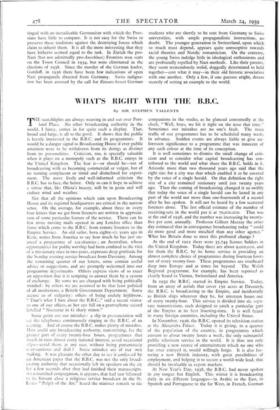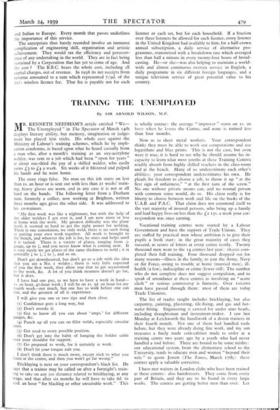WHAT'S RIGHT WITH THE B.B.C.
By SIR STEPHEN TALLENTS
THE searchlights are always weaving in and out over Port- land Place. No other broadcasting authority in the world, I fancy, comes in for quite such a display. That, broad and large, is all to the good. It shows that the public is keenly interested in the B.B.C. and its programmes. It would be a danger signal to Broadcasting House if ever public attention were to be withdrawn from its doings as distinct from its personalities. Criticism, too, is specially valuable when it plays on a monopoly such as the B.B.C. enjoys in the United Kingdom. The fear is—or should be—not of broadcasting with us becoming commercial or vulgar, but of its turning complacent or timid and disinclined for experi- ment. The more lively and well-informed criticism the B.B.C. has to face, the better. Only so can it hope to achieve a virtue that, like Olivia's beauty, will be in grain and will endure wind and weather.
Not that all the opinions which rain upon Broadcasting House and its regional headquarters are critical in the narrow sense. On the average, for example, about three in every four letters that we get from listeners are written in apprecia- tion of some particular feature of the service. There can be few more moving mails opened in any London office than those which come to the B.B.C. from remote listeners to the Empire Service. An old sailor, born eighty-six years ago in Kent, writes from America to say how much he has just en- joyed a programme of sea-shanties ; an Australian, whose opportunities for public worship had been confined to the visit of a missionary once in two years, expresses deep gratitude for the Sunday evening service broadcast from Daventry. Among the remaining quarter of our letters, some contain useful advice or suggestions, and are promptly welcomed into our programme departments. Others express views of so exact an opposition that it is tempting to answer them by a system of exchange. By some we are charged with being politically minded : by others we are assumed to be that least political of all institutions, a British Government Department. Some accuse us of vulgarity : others of being unduly highbrow. "That's what I hate about the B.B.C.," said a recent visitor to one of our offices, as her eye fell on a gramophone record labelled "Nocturne in G sharp minor."
Some point out our mistakes : a slip in pronunciation will set the telephones continuously ringing in the B.B.C. of an c ;ening. And of course the B.B.C. makes plenty of mistakes. How could any broadcasting authority, transmitting, for the greater part of every twenty-four hours, programmes that touch in turn almost every national interest, avoid occasional slips—avoid them, at any rate, without being portentously 0:er-cautious and dull ? Some mistakes are of our own making. It was pleasant the other day to see it confessed by an American paper that the B.B.C. was not the only broad- casting authority that occasionally left its speakers on the air for a few seconds after they had finished their manuscripts. An astonished congregation, it appears, that had just followed to its fervent close a religious service broadcast in the St. Louis " Pulpit of the Air," heard the minister remark to his companions in the studio, as he glanced contentedly at the clock, "Well, boys, we hit it right on the nose that time."
Sometimes our mistakes are no one's fault. The main traffic of our programmes has to be scheduled many weeks in advance. Sudden events are always liable to give un- foreseen significance to a programme that was innocent of any such colour at the time of its conception.
It is well sometimes to dismiss the small change of criti- cism and to consider what capital broadcasting has con- tributed to the world and what share the B.B.C. holds in it.
Aristotle more than two thousand years ago said that the right size for a city was that which enabled it to be covered by the voice of a single herald. On that definition the right size of a city remained stationary until just twenty years ago. Then the coming of broadcasting changed it so swiftly that today the voice of a single herald can be heard in any part of the world not more than one-fourteenth of a second after he has spoken. It will not be heard by a few scattered listeners alone. The last official estimate of the number of receiving-sets in the world put it at 70,000,000. That was at the end of 1938, and the number was increasing by twenty- five per cent. annually. Professor Gilbert Murray the other day estimated that in consequence broadcasting today "could do more good and more mischief than any other agency." What has Britain done to meet this profound change ?
At the end of 1922 there were 35,744 licence holders in the United Kingdom. Today there are about 9,000,000, and for them the B.B.C. by its home service is providing an almost complete choice of programmes during fourteen hours out of every twenty-four. These programmes are overheard deep into Europe and at times far beyond_ The Welsh Regional programme, for example, has been reported as clearly heard in Vienna, Switzerland and America.
In 1932 the B.B.C. started its Empire Service. Today, from an array of aerials that cover 15o acres at Daventry, the B.B.C. is broadcasting to the Empire, and incidentally to British ships wherever they be, for nineteen hours out of every twenty-four. This service is divided into sh. sepa- rate transmissions, each designed to catch a particular part of the Empire at its best listening-time. It is well heard in many foreign countries, including the United States.
In November, 1936, the B.B.C. opened its television station at the Alexandra Palace. Today it is giving, to a quarter of the popu!ation of the country, in programmes which amount to about twenty hours a week, the only substantial public television service in the world. It is thus not only providing a new source of entertainment which no one who has once enjoyed it, would_ willingly forgo. It is also fos- tering a new British industry, with great possibilities of employment, and helping it to secure a world-wide lead, that should be invaluable in export markets.
At New Year's Day, 1938, the B.B.C. had never spoken in any tongue but English. This winter it is broadcasting daily in six different languages—in Arabic to the East, in Spanish and Portuguese to the far West, in French, German and Italian to Europe. Every month that passes underlines the importance of this service.
The enterprises thus barely recorded involve an immense complication of engineering skill, organisation and artistic achievement. They would tax the efficiency and persever- ance of any undertaking in the world. They are in fact being sustained by a Corporation that has yet to come of age. And the cost ? The B.B.C. bears the whole cost, including all capital charges, out of revenue. In 1938 its net receipts from revenue amounted to a sum which represented 7/9d. of the 0/- wireless licence fee. That fee is payable not for each listener or each set, but for each household. If a fraction over three listeners be allowed for each licence, every listener in the United Kingdom had available to him, for a half-crown annual subscription, a daily service of alternative pro- granuries, transmitted with a breakdown rate which averaged less than half a minute in every twenty-four hours of broad- casting. He—or she—was also helping to maintain a world- wide and almost continuous oversea service in English, a daily programme in six different foreign languages, and a unique television service of great potential value to his country.















































 Previous page
Previous page